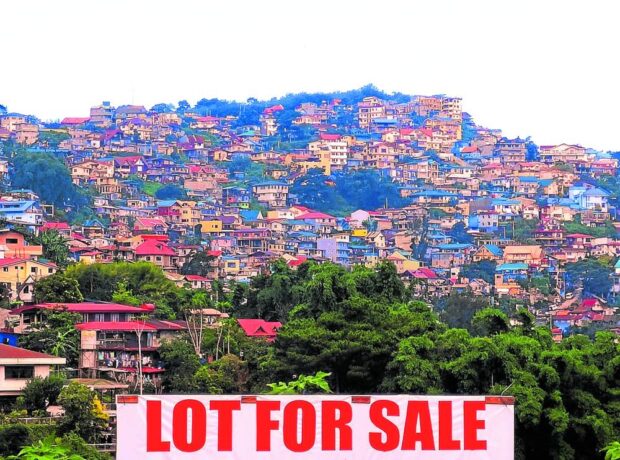
PRIME PROPERTY Baguio City, the country’s summer capital, has some of the country’s most coveted properties because of its status as a townsite reservation. All Baguio land within the reservation are alienable—except for civil, military and forest reservations—with many private lands up for sale, like this lot shown in this photo taken on Aug. 26, 2022. —EV ESPIRITU
BAGUIO CITY—The Department of Environment and Natural Resources (DENR) intends to complete land titling in the Cordillera, particularly at the summer capital, by 2026 using satellite-aided technology, the agency’s regional chief said on Wednesday.
The sale of lands in Baguio City, which is originally a townsite reservation, is currently being jointly screened by the city government and DENR secretary, said Ralph Pablo, DENR Cordillera director, during a briefing.
Pablo said the systems for processing land patents have been improved and have sped up the inspection, verification and approval of land surveys.
Also, land management experts now utilize aerial and satellite-fed data that would be part of a cadastral database, he added.
First land patent
Baguio is covered by the Original Certificate of Title (OCT) No. 1, the country’s first land patent, which was issued by the American colonial government in the 57-square-kilometer territory of this city, which is a townsite reservation.
As a townsite, all lands within the 2,920.37-hectare reservation are “alienable and disposable (or can be sold),” except for forest lands and civil and military reservations that were segregated via proclamations.
Townsite sales helped generate funds for the fledgling city when Baguio first opened to migrants seeking a summer sanctuary.
But even as authorities were screening the townsite sales applications (TSA) for Baguio, the lingering “Igorot claims” that have been unresolved since the start of the 20th century, as well as the 1987 Constitution’s recognition of ancestral lands, have made land titling in Baguio more complicated.
Apart from overlapping land claims, townsite sales processing was also plagued by anomalies and bureaucratic delays, generating a backlog that dates back to 1990.Screening
The DENR did not release how many TSA still need to be cleared and titled. But during a land summit on Sept. 13, 2019, the agency said 13,637 townsite lots (spanning 1,810.07 ha) were cleared during an administrative and judicial screening as of that period.
But many land conflicts need to be untangled by technical experts or have been elevated to local courts, which could make the DENR’s 2026 deadline “unattainable,” given that it has been taking years for the DENR to resolve cases in its jurisdiction, Councilor Isabelo Cosalan told the Inquirer on Friday.
Baguio should instead put a cap on land sales to solve overpopulation and overdevelopment and to preserve more lands for tree planting, added Councilor Jose Molintas, an Ibaloy human rights lawyer, in a separate interview.
Exempt
The Baguio city government also identified townsite lands for its own need, which are now being titled by the DENR.
On March 3, the city government became owners of a 182,040-square-meter (18.2 ha) section of the century-old Burnham Park, with the issuance of the OCT No. 2023000017. The city government applied for a land title so after discovering that a third of the historic park was not covered by OCT 1 and could be purchased by private citizens.
Elsewhere in the Cordillera, ancestral land titling has become an option for indigenous Filipino households that are unable to secure titles for settlements that are within 18-degree slopes.
Baguio and Benguet province, as well as Cebu, are exempt from the rule on 18-degree slopes via Presidential Decree (PD) No. 1998 that was issued in 1985.
For the rest of the country, however, the 1975 Forestry Code (PD 705), which covers virtually all highland communities in the mountain region, applies when securing a land title.
The law states that “no land of the public domain eighteen percent in slope or over shall be classified as alienable and disposable, nor any forest land fifty percent in slope or over, as grazing land.”
The ban excludes properties “already covered by existing titles or approved public land applications or that were actually occupied openly, continuously, adversely and publicly for a period of not less than thirty years as of the effectiveness of this Code, where the occupant is qualified for a free patent under the Public Land Act.”

